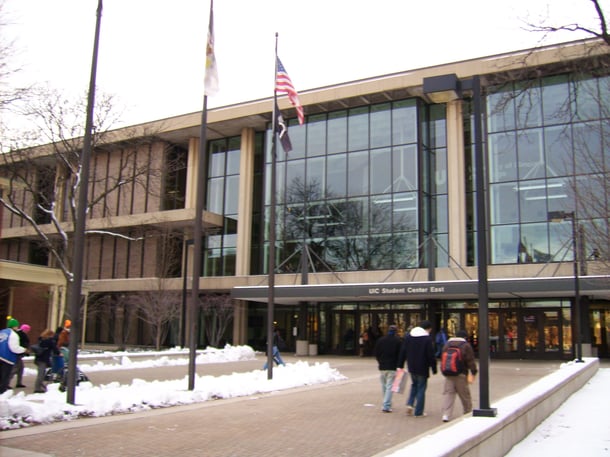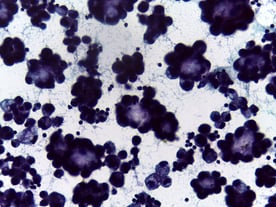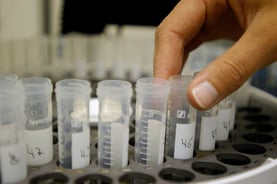More than $2 million in grants were awarded to 11 University of Wisconsin faculty members for a wide range of research projects on the Madison campus. Ten of the projects, with an average award of $194,000, were selected by the university’s Data Science Initiative. The 2018 Burroughs Wellcome Award, which provides $500,000 over five years, supports the advancement of biomedical science on campus.
Read MoreTags: Wisconsin, University of Wisconsin, University of Wisconsin Madison, UWisc, Alzheimer's, Research Funding, Madison, 2016, university research funding

(Image courtesy of Wikimedia commons)
The National Institutes of Health (NIH) awarded a four year, $17.7 million grant to the university of Illinois at Chicago’s Center for Clinical and Transitional Science to further translational research.
Read MoreTags: University of Illinois, University of Illinois Chicago, Translational Research, University of Illinois at Chicago, Chicago, biotech vendor show, NIH award, UI Chicago, UIC, UIChgo, University of Illiniois, 2016, Bioresearch Grant
Although people expect to go to the hospital to be treated for their illnesses, sometimes patients can acquire fungal infections during treatment that can make them even sicker. The fungus Candida albicans is a common hospital-acquired fungus that can get into the bloodstream and vital organs, leading to a mortality rate of up to 75% of infected patients. Researchers at The Ohio State University in Columbus have found a potential approach to fight these infections.
Read MoreTags: Ohio State University, Columbus, OH, OhStu, 2016, BioResearch Product Faire, Candida albicans
Researchers from UCLA and partnering schools guided by Laurent Bentolila found evidence supporting the spread of malignant cells through angiotropism with vascular co-option, and even suggested they may be related or identical processes. These findings were published in Nature Scientific Reports. With angiotropism being the ability for cells to travel along surface of blood vessels, but not be inside of them, also called extravascular migratory metastasis (EVMM) and vascular co-option being the ability for a tumor to use a blood supply and travel along it, this means cancer has an outlet to spread outside of the bloodstream. The spread outside of the bloodstream means some current methods of treating cancer would be ineffective.
“... if the metastasizing cells are on the outside of the blood vessels, they escape exposure to the treatment and continue to spread cancer.”
-Laurent A. Bentolila
Read MoreTags: CA, University of California Los Angeles, cancer research, Los Angeles, Cancer, LAVS, UCLA, laboratory, lab products, 2016
Over 6 million cosmetic surgery procedures are done each year using Botox, a form of the botulinum toxin. However, besides reducing wrinkles, botulinum toxins are used to treat over 20 medical conditions. These include severe neck and shoulder muscle spasms, chronic migraines, excessive sweating, leaky or over active bladders, facial spasms, and Cerebral Palsy. Botulinum toxins are also quite deadly. In fact, one gram--the equivalent to ¼ teaspoon of sugar--could kill over a million people.
Read MoreTags: UW, Wisconsin, University of Wisconsin, University of Wisconsin Madison, UWisc, UW Madison, Biotechnology Vendor Fair, Madison, BioResearch Fair, Bioreseach, 2016, wisconsin science trade fair, University of Wisconsin School of Medicine, Botox, botulinum
The University of Illinois at Chicago received a two-year, $475,000 grant to study a new treatment for type 1 diabetes that might help protect the pancreas. This promising new treatment would involve using two protein molecules to reduce the damage caused by the body’s autoimmune response. The research led by Dr. Bellur S. Prabhaker, Professor of Microbiology and Immunology at UIC, could eventually free many diabetes patients from the rigors of daily insulin injections.
Read MoreTags: Bioresearch, Bioresearch funding, University of Illinois, University of Illinois Chicago, Diabetes, Illinois, University of Illinois at Chicago, Chicago, biotech vendor show, UIC, UIChgo, 2016, Dr. Prabhakar, Diabetes research
 According to the American Cancer Society, nearly 1 in 8 women will develop breast cancer in their lives, making it the second most common cancer for American women. However, breast cancer does not affect all women equally. Past studies have shown that women of African descent with breast cancer die at a higher rate than white women. Researchers at the University of Southern California Keck School of Medicine have received a grant of $12 million from the National Cancer Institute (NCI) to study the disparities in breast cancer in women.
According to the American Cancer Society, nearly 1 in 8 women will develop breast cancer in their lives, making it the second most common cancer for American women. However, breast cancer does not affect all women equally. Past studies have shown that women of African descent with breast cancer die at a higher rate than white women. Researchers at the University of Southern California Keck School of Medicine have received a grant of $12 million from the National Cancer Institute (NCI) to study the disparities in breast cancer in women.
Tags: CA, University of Southern California, breast cancer research, California, USC, BioResearch Product Faire Event, NIH grant, cancer research funding, 2016
In 2014, the Wisconsin Alzheimer's Disease Research Center received a five-year grant from the NIH totalling $7.5M dollars. The center was the first of its kind, created in 2009, and has provided a focused place of research on Alzheimer's diagnosis and treatment. With funding through March of 2019, the center is moving forward, with one recent publication indicating a panel of biomarkers that have been linked with Alzheimer's.
Read MoreTags: Wisconsin, University of Wisconsin, University of Wisconsin Madison, UWisc, Alzheimer's Research, Alzheimer's, Madison, 2016
 Since it's founding in 2006, the Herbert and Florence Irving Institute for Clinical and Translational Research at the Columbia University Medical Center, in partnership with the New York-Presbyterian Hospital in New York, has provided more than 2,000 scientists with new opportunities of conducting clinical and translational research leading to quicker developments and deliveries of treatments. Recently, the National Center for Advancing Translational Sciences (NCATS) awarded the Irving Institute a grant of $58.4 million over the next five years to help the Institute further the translational research being conducted.
Since it's founding in 2006, the Herbert and Florence Irving Institute for Clinical and Translational Research at the Columbia University Medical Center, in partnership with the New York-Presbyterian Hospital in New York, has provided more than 2,000 scientists with new opportunities of conducting clinical and translational research leading to quicker developments and deliveries of treatments. Recently, the National Center for Advancing Translational Sciences (NCATS) awarded the Irving Institute a grant of $58.4 million over the next five years to help the Institute further the translational research being conducted.
Tags: Columbia University, Columbia, NY, NIH grant, new funding, 2016, BioResearch Product Faire, Irving Institute, Clinical and Translational Research
 DefeatHIV, an initiative based out of the Fred Hutchinson Cancer Research Center in Seattle, WA, has been researching potential cures for HIV over the past 5 years. Their research has focused on the use of blood cells genetically modified to be resistant to the HIV virus. It was recently announced that the National Institutes of Health (NIH) awarded the DefeatHIV team a new grant of $23.5 million that will continue to support their research on this potential cure for an additional 5 years.
DefeatHIV, an initiative based out of the Fred Hutchinson Cancer Research Center in Seattle, WA, has been researching potential cures for HIV over the past 5 years. Their research has focused on the use of blood cells genetically modified to be resistant to the HIV virus. It was recently announced that the National Institutes of Health (NIH) awarded the DefeatHIV team a new grant of $23.5 million that will continue to support their research on this potential cure for an additional 5 years.
Tags: Fred Hutchinson Cancer Research Center, WA, Seattle, Hutch, 2016, BioResearch Product Faire, HIV Vaccine, HIV research, DefeatHIV

